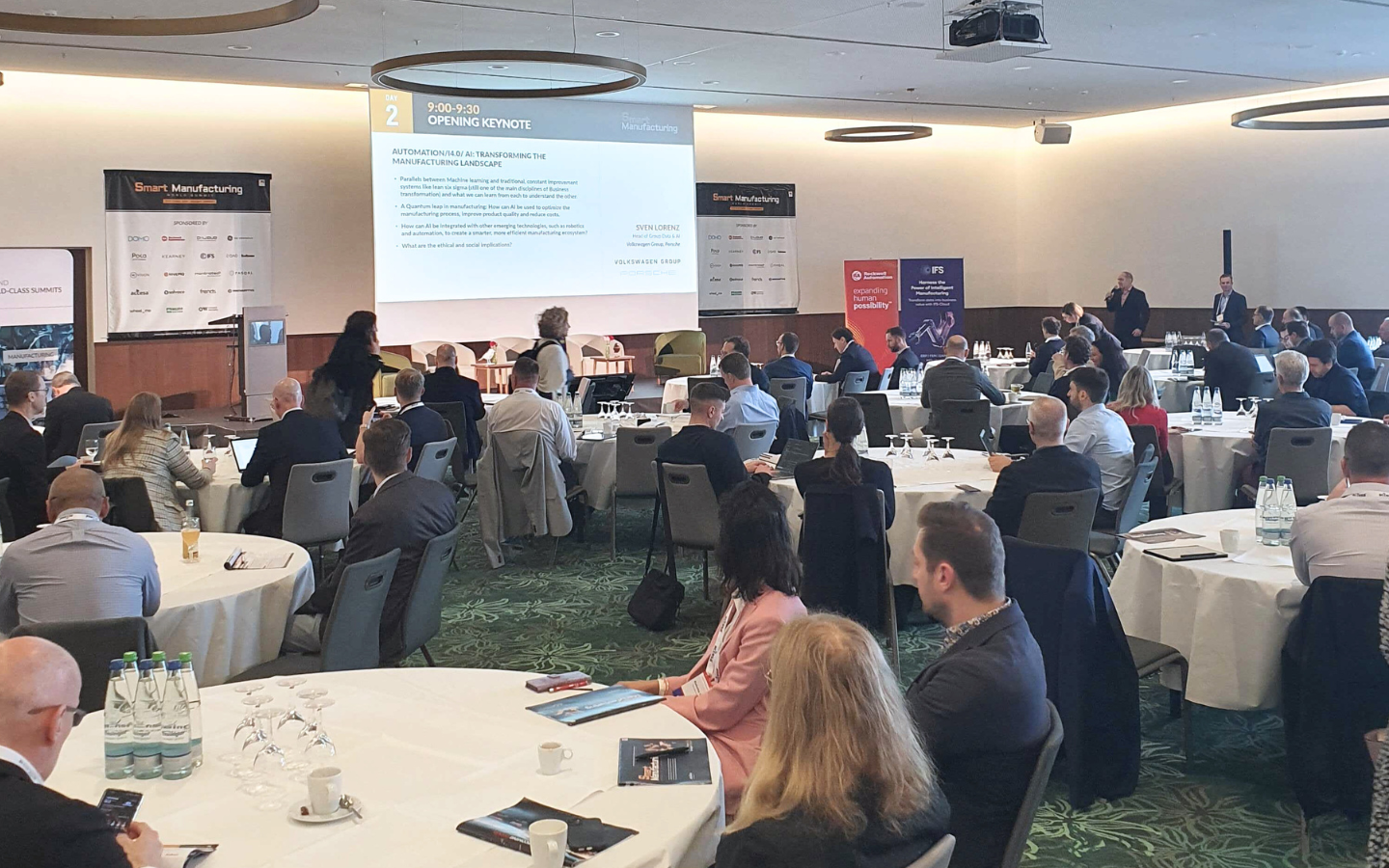Manufacturing firms are turning to Artificial Intelligence (AI) to stay ahead of the curve. At the recent Stuttgart Smart Manufacturing World Summit, I attended at the end of the month, Andrew Burton, Global Industry Director of Manufacturing at IFS, delivered a compelling presentation that showcased how AI is transforming manufacturing from a traditional, labour-intensive industry into a high-tech, smart sector.
Listening to Andrew Burton’s presentation at the Stuttgart Smart Manufacturing Summit has made it clear: the future of manufacturing lies in AI.
AI is Already Reshaping the Manufacturing Landscape
Manufacturing has undergone significant transformations over the decades, continuously integrating technological advancements to enhance productivity and efficiency. In his presentation, Burton outlined how the advent of AI has ushered in an unprecedented era of smart manufacturing, where processes are accelerated, and quality and costs are precisely optimized. It was confirming for me to see that AI is not just a futuristic concept but a practical tool that is already reshaping the manufacturing landscape.
Key Technologies and Applications of AI in Manufacturing
Among the highlights of this presentation were several key AI technologies and applications that are making substantial impacts on the manufacturing industry:
- Predictive Maintenance: Leveraging AI, predictive maintenance transforms data from equipment into actionable insights, enabling the prediction and prevention of potential failures. It helps manufacturing companies anticipate maintenance needs, thus avoiding unplanned outages of critical machinery.
- Digital Twins: Sophisticated virtual models, known as Digital Twins, are revolutionising the way physical processes are simulated, offering a risk-free environment to forecast the outcomes of various scenarios. They provide a sandbox for testing “what-if” scenarios, greatly enhancing decision-making capabilities.
- Virtual Prototyping: The design process has been made more efficient than ever with AI-driven virtual prototyping, allowing for rapid iterations and better final products. This technology uses historical data and simulations to optimize new product designs, reducing time-to-market and resource wastage.
These technologies and applications not only improve efficiency but also reduce costs and enhance the overall quality of production.
Analyzing Vast Amounts of Logistics Data
I noticed that AI is extending its benefits beyond the factory floor, rapidly entering areas such as supply chain management, which includes production scheduling and demand forecasting:
- Supply Chain Optimization: AI algorithms analyse vast amounts of logistics data to streamline inventory management, reduce delivery times, and optimize supplier selection.
- Enhanced Production Scheduling: By integrating AI with ERP systems, real-time data collection and analysis are facilitated, which ensures optimal production flows and waste reduction. The integration of AI into production scheduling systems further enables dynamic and flexible operations that can adapt to the ever-changing business landscape.
- Upgraded Demand Forecasting: AI enhances forecasting by assimilating external data sources such as weather patterns, social media trends, and global industry events. This intelligence allows manufacturers to align production schedules more closely with market demands, ensuring optimal stock levels and customer satisfaction.
Challenges and Considerations for AI Adoption
Despite the advantages, adopting AI in manufacturing is not without challenges. As this technology continues to mature, the emphasis on high-quality data becomes even more crucial for companies aiming to remain at the cutting edge of smart manufacturing. Thus, data integration, initial investment costs, and resistance to change remain significant hurdles. However, businesses can overcome these by fostering a culture that embraces digital transformation, investing in quality data collection and management systems, and providing ongoing training and support for staff.
The Time to Act is Now!
Listening to Andrew Burton’s presentation at the Stuttgart Smart Manufacturing Summit has made it clear: the future of manufacturing lies in AI. Companies that wish to remain competitive in this rapidly evolving landscape should consider how best to integrate AI into their operations. Whether through incremental changes or comprehensive overhauls, the time to act is now.The journey towards smart manufacturing is complex but rewarding, and with the right tools and strategies, your company can achieve unprecedented success in the digital age.
Adoption of Qlector Leap as a Pivotal Step
In line with this transformative journey, adopting Qlector Leap can be a pivotal step for manufacturing companies aiming to scale new heights in production excellence. This solution excels in AI-supported production planning, scheduling, and optimisation, bringing a new level of intelligence and efficiency to the production floor. It harnesses the power of real-time data and predictive analytics to optimize every aspect of the manufacturing process, from supply chain logistics to equipment maintenance and people scheduling.
Join the Ranks of Innovative Leaders
By adopting this solution, you can join the ranks of innovative leaders, such as Bosch, ams Osram, Agrana, and many others, who are already setting new standards in smart manufacturing. If you’re interested in learning how Qlector Leap can revolutionise your production planning, production scheduling and production optimisation processes, feel free to reach out to me at [email protected].
